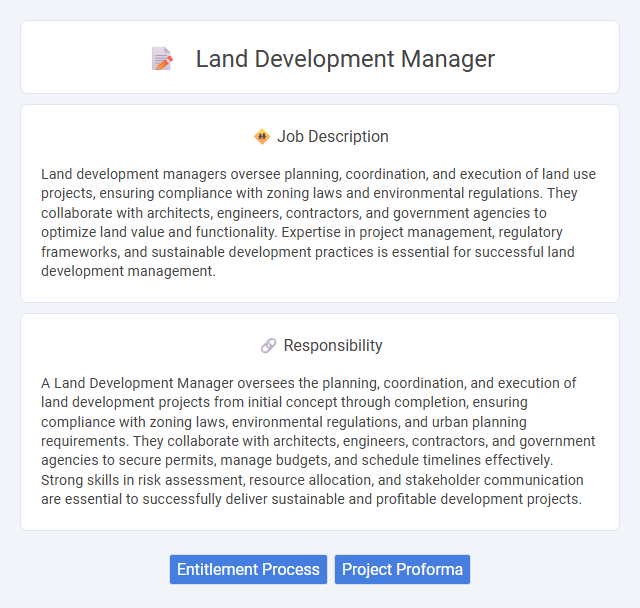
Land development managers oversee planning, coordination, and execution of land use projects, ensuring compliance with zoning laws and environmental regulations. They collaborate with architects, engineers, contractors, and government agencies to optimize land value and functionality. Expertise in project management, regulatory frameworks, and sustainable development practices is essential for successful land development management.
Individuals with strong organizational skills and an aptitude for strategic planning are likely to be well-suited for a Land Development Manager role. Those comfortable with multitasking and navigating regulatory frameworks might find themselves thriving in this dynamic position. Candidates who prefer routine tasks or struggle with collaborative environments may face challenges adapting to the demands of this job.
Qualification
A Land Development Manager typically requires a bachelor's degree in civil engineering, urban planning, or a related field, with several years of experience in land development or real estate project management. Proficiency in zoning regulations, environmental laws, and project management software is essential for overseeing site planning, permits, and construction coordination. Strong leadership skills and the ability to negotiate with government agencies, contractors, and stakeholders are crucial for successful project delivery.
Responsibility
A Land Development Manager oversees the planning, coordination, and execution of land development projects from initial concept through completion, ensuring compliance with zoning laws, environmental regulations, and urban planning requirements. They collaborate with architects, engineers, contractors, and government agencies to secure permits, manage budgets, and schedule timelines effectively. Strong skills in risk assessment, resource allocation, and stakeholder communication are essential to successfully deliver sustainable and profitable development projects.
Benefit
Land development managers likely benefit from a competitive salary and bonuses tied to project success. They probably enjoy opportunities for career growth by leading complex planning and construction initiatives. Access to a network of industry professionals and exposure to cutting-edge development technologies may also enhance their professional skill set.
Challenge
Land development managers likely face complex challenges involving regulatory compliance and zoning laws that can delay project timelines. Managing diverse stakeholder interests and budget constraints might increase the pressure to deliver successful outcomes. Navigating environmental impact assessments and adapting to market fluctuations may require strong problem-solving and strategic planning skills.
Career Advancement
Land development managers oversee planning, permitting, and coordination of construction projects, ensuring compliance with zoning and environmental regulations. Career advancement often involves progressing to senior management roles, such as director of development or project executive, with expanded responsibilities in strategic planning and client relations. Strong skills in project management, negotiation, and regulatory knowledge enhance prospects for leadership positions and higher compensation in the real estate and construction industries.
Key Terms
Entitlement Process
A Land Development Manager oversees the entitlement process by securing necessary permits and approvals from local government agencies to allow project construction. They coordinate zoning applications, environmental assessments, and community meetings to ensure compliance with regulations and alignment with stakeholder interests. Expertise in navigating complex land use laws and maintaining strong relationships with municipal planners is critical for streamlined project advancement.
Project Proforma
A Land Development Manager oversees the creation and analysis of project proformas to ensure financial feasibility and profitability of land projects. This role involves detailed cost estimation, revenue forecasting, and risk assessment to optimize land acquisition, infrastructure development, and sales strategies. Expertise in budgeting, market trends, and regulatory compliance is critical to accurately projecting returns and guiding investment decisions.
 kuljobs.com
kuljobs.com